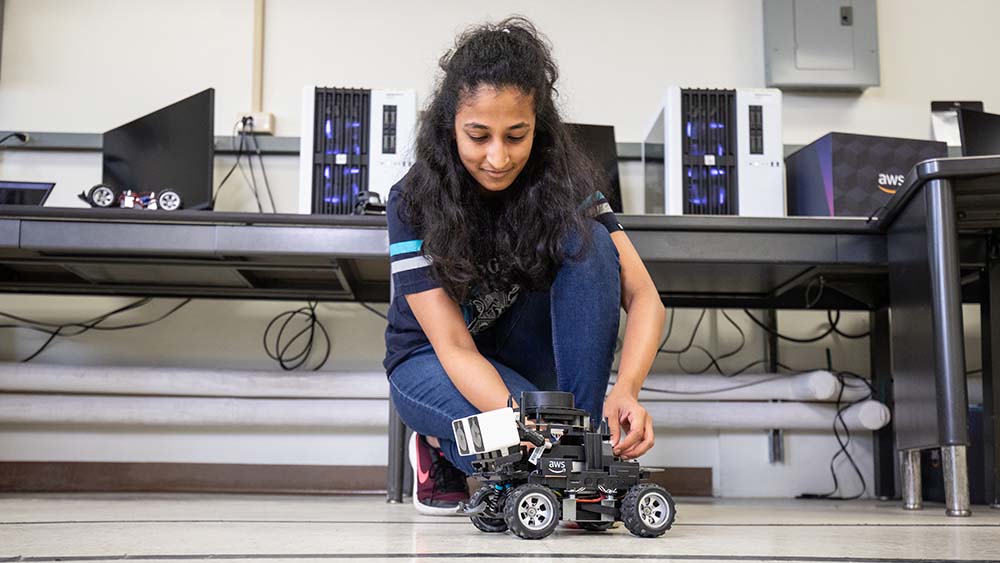
What is the Electronics Industry?
Engineers in the electronics industry can design electronic circuits, devices, integrated circuits and their systems. Graduates can work in various industries, from manufacturing to technology development.
Majors that Could Lead to Electronics Careers
Students interested in electronics careers could start their career paths through several majors offered by the Texas A&M University College of Engineering.
See below for a list of some of our majors that could lead to an electronics career.
- Biological and agricultural engineering: Biological and agricultural engineers create sensors to test air, water and soil quality and to determine crop growth, crop yield and nutrient and pesticide needs. They use robotics, computer models and remotely sensed data from crewless aerial vehicles and satellites to sense soil moisture; apply irrigation, nutrients and pesticides; predict soil and water movement; and test best management practices for environmental sustainability.
- Chemical Engineering: Chemical Engineers contributed to the invention of semiconductor chips. Chemical engineering scientists are vital in the ongoing development of advanced materials and the manufacturing processes required to produce them, and there are many faculty who are active in the field of microelectronics research.
- Computer engineering: Students will gain an in-depth understanding of smartphones, computers and other smart appliances, which will transfer into skills used in an electronics career.
- Computer science: Computer scientists create personal computing devices that range from cellphones to smart appliances. Computing professionals work on developing the usability of device designs, making microchips more efficient and enhancing human/computer interaction.
- Data engineering: Data engineers use advanced data science tools to model and solve problems with electronic systems in the presence of uncertainty. They perform risk analysis and develop reliability models using multiple data sources.
- Electrical engineering: Electrical engineers will gain an in-depth understanding of smartphones, computers and other smart appliances, which will transfer into skills used in an electronics career.
- Electronic systems engineering technology: Classes provide insight into creating schematics for electronic designs, prototyping analog and digital electronics, printed circuit board layout and construction, and instrumentation setup for test and measurement.
- Industrial and systems engineering: Industrial engineers create electrical systems and increase safety in electrical grids. Their work helps power the nation and the world.
- Industrial distribution: Students learn about sales, marketing, design and value-added services of electronic components, which will help them serve in manufacturing, construction, automotive and defense sectors.
- Material science engineering: Engineers build modern electronics using our ability to make billions of nanoscale circuits deposited on individual silicon wafers. To make tomorrow's electronics, materials engineers are exploring the properties of quantum materials for quantum computing and neuromorphic materials to emulate efficient biological memory and processing.
- Mechanical engineering: Within the range of skill sets that mechanical engineering students gain, topics such as design of electromechanical systems, hardware and protective housing design, component design and materials development, cooling systems and packaging design will help provide a solid foundation for entering an electronics career.
- Multidisciplinary engineering: A multidisciplinary engineering degree helps engineers working in applied mechatronics to design and develop smart electromechanical systems. In the electronics industry, workers can use a combination of precision engineering, electronic control and systems thinking in the design of products and manufacturing processes.
- Multidisciplinary engineering technology: Students understand and experience embedded systems and printed circuit board design, which will transfer into skills used within electronics careers.
- Ocean engineering: Ocean engineers train to create and improve automation systems and remotely operated systems such as dredges, undersea vehicles, surface vehicles and energy platforms. They gain a wide skill set that is versatile to the development of electronics and systems.